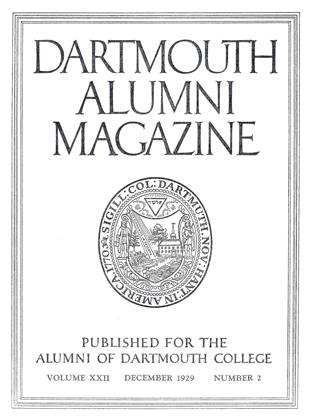The Division of International Law of the Carnegie Endowment for International Peace, 12 Jackson Place, Washington, D. C, announces that fellowships in international law will be awarded for the academic year 1930- 1931, according to the following regulations:
1- These fellowships have been established by the Trustees of the Endowment for the purpose of providing an adequate number of teachers competent to give instruction in international law and related subjects, as an aid to the colleges and universities in extending and improving the study and teaching of those subjects, which are daily becoming increasingly of more interest and importance in the conduct of international affairs. Only those who intend to aid in this work are, therefore, expected to apply for these fellowships.
2. Two classes of fellowships will be awarded: (a) Teachers' Fellowships, (6) Students' Fellowships. Applicants should indicate the class of fellowship for which application is made.
(a) Teachers' Fellowships will be awarded only to applicants who have taught international law or related subjects for at least one year. An equivalent in practical experience may be submitted. The stipend attached to such fellowships is $1,500. Teachers' Fellowships awarded for study abroad will carry an additional stipend of $300 on account of the cost of the transoceanic passage.
(6) Students' Fellowships will be awarded only to graduate students holding the equivalent of a bachelor's degree. The stipend attached to such fellowships is $1,000. Study abroad is permitted, but no additional stipend for transoceanic passage is attached to these Students' Fellowships,
3. In general, a knowledge of the elements of international law and a good knowledge of history are necessary, and it is desirable that at least two modern languages be furnished. Other special previous preparations will also be considered. An applicant who wishes to study abroad must be able to read and write the language of the foreign country in which he elects to study.
4. The Fellow shall register as a student at a university or college at which he can devote his entire time to studying international law and related subjects. No other employment may be engaged in during the period covered by the Fellowship. Courses of study must be submitted to and approved by the Committee on Fellowships, and the Fellow shall report to the Committee at such times during the year as he may be directed.
5. The stipends are payable in instalments upon compliance with the regulations, communicated with the awards, governing the submission of reports and evidence of work.
6. A holder of a fellowship is not precluded from applying for a fellowship for a succeeding year.
7. Each applicant is required to furnish a signed photograph, showing the date when it was taken.
8. Applications will be received up to March 1, 1930. Application blanks will be furnished upon request addressed to The Committee on International Law Fellowships, 2 Jackson Place, Washington, D. C.
JAMES BROWN SCOTT, Director
 View Full Issue
View Full Issue
More From This Issue
-
 Class Notes
Class NotesCLASS OF 1923
December 1929 By Truman T. Metzel -
 Article
ArticleAlumni Associations
December 1929 -
 Article
ArticleAlumni Council Meets in New York
December 1929 -
 Article
ArticleCarnegie Report
December 1929 -
 Article
ArticleThe Dartmouth Indians
December 1929 By Eric P. Kelly -
 Sports
SportsThe Yale Epic
December 1929 By Phil Sherman
Article
-
 Article
ArticleTO TEST FRESHMAN MINDS
-
 Article
ArticleNEW BOOK BY P. S. MARDEN '94
March 1921 -
 Article
Article"The Stratton Ridge Salt Dome
NOVEMBER, 1926 -
 Article
ArticleCube Cabin Destroyed
February 1934 -
 Article
ArticleGeorge H. Howard Jr. '47 has been elected
November 1959 -
 Article
Article30TH CARNIVAL TO BE A BIG BIRTHDAY PARTY
February 1940 By Peter Glenn '41

